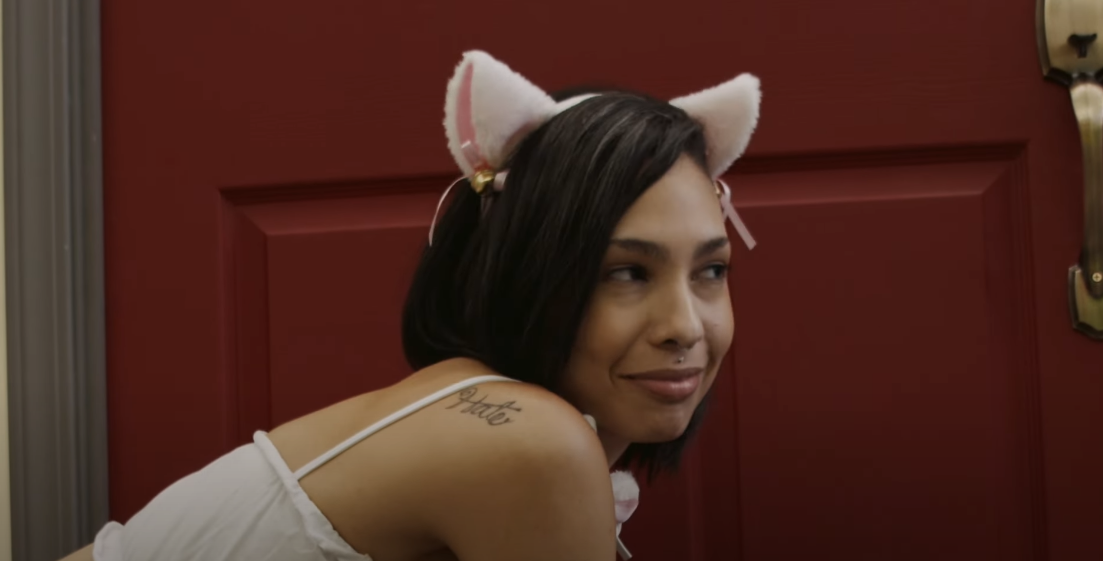Scott Hillman’s Baby Cat is one of those movies you can’t quite categorize. At 88 minutes, it’s a curious blend of surreal comedy, experimental drama, and a dash of vigilante-thriller — anchored by a premise so out-there you can’t help but be intrigued. Dana (Natalie Cotter) moves to Los Angeles after a breakup and finds herself in a strange new apartment complex. Her job at an oil company is lonely and monotonous, and her boss (Jay Hewlett) behaves as if he’s managing an entire office rather than a single employee. But the real eccentricity begins at home, where Dana encounters two unusual neighbors: Max Power (Socks Whitmore), who sports open shirts exposing post-surgical scars, and a scantily clad woman known only as “The Cat” (Fawn Winters), who walks on all fours, meows instead of speaking, and slowly becomes Dana’s love interest.
On paper, it’s an original, even daring setup — a romance between a woman and a self-styled feline performance artist, all against a backdrop of vigilante crime-fighting. Hillman clearly wanted to make something bold, and there’s no denying that Baby Cat is distinct in a sea of formulaic indie comedies. The film has a playful, sometimes hypnotic rhythm, and Winters, an Instagram-famous performer, does surprisingly solid work in a near-wordless role. She brings a strange mix of vulnerability and camp to “The Cat,” and those are easily the most memorable scenes in the movie.
Unfortunately, the execution rarely matches the ambition. The script often feels underdeveloped, with little explanation for why characters behave the way they do — especially the world’s casual acceptance of a woman living as a cat. Questions like how long this “Cat” persona has existed, or whether Dana’s feelings are authentic or just a projection, go unanswered. Natalie Cotter is miscast as Dana, struggling to make the lead sympathetic or relatable, and many secondary characters drift in and out without purpose. The subplot involving a mysterious crime syndicate and a stealth vigilante sounds intriguing but feels tacked on, more of a distraction than a payoff.
Technically, Baby Cat also falters. The budget constraints are glaring: green-screen backdrops look like placeholders, editing zooms into low-resolution footage, and at least one flash-frame error sneaks into the final cut. Scenes of deliveries and side characters (like Frank from HR or random crime bosses) feel like padding rather than narrative building. Even for a microbudget indie, the compositing and keying are distractingly amateurish — especially in shots with moving backgrounds, which only accentuate the flaws.
Still, for all its rough edges, there’s something almost endearing about how completely Hillman commits to the bit. This is not a safe, calculated film but a scrappy, oddball experiment. Viewers with a taste for so-bad-it’s-good cinema or “bad movie night” discoveries may find themselves entertained, if not for the reasons the filmmaker intended. At its best, Baby Cat is one-of-a-kind — unpredictable, sometimes hypnotic, and genuinely unlike anything else released in 2023. At its worst, it’s cringe-inducing and incoherent.
Verdict: If you’re curious about offbeat, no-rules indie filmmaking — or just want to see a brave, mostly wordless performance from Fawn Winters — Baby Cat may be worth a look. If you’re expecting a polished comedy or a cohesive story, prepare for a very different experience. Either way, nothing can quite prepare you for this movie.
Jessie Hobson



